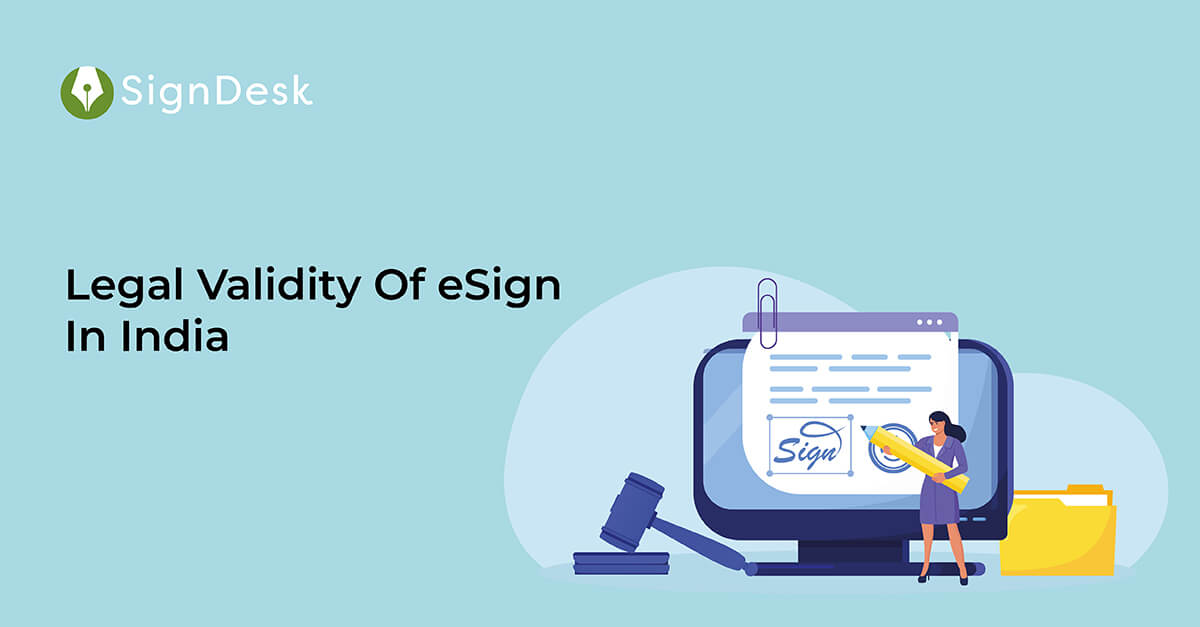eSign In India
An electronic signature (eSign) is set to make life simpler in various ways. Just as we have changed the way we go shopping, we can save ample time by switching to signing documents online without even stepping foot out of our homes.
Furthermore, one can enter into an agreement with another person in some remote location without even physically meeting him/her.
Using eSign in enterprises and businesses would make record administration pretty much easier.
eSign refers to the information in the electronic shape and is utilized by a signatory to sign. Each online transaction requires special and solid assurance which is served by eSign.
Information Technology Act, 2000 introduced the possibility of eSign in India.
The Government of India has declared a technique that encourages confirming the power to offer eSign support to all the natives who have an Aadhaar ID.
Each Aadhaar-holder with an Aadhaar-registered mobile number is permitted to digitally sign a report. The eSign administration is encouraged by verifying the Aadhaar-holder utilizing the Aadhaar based eKYC administration.
Advantages Of eSign
- Saves time and money
- Aadhaar KYC based affirmation
- Improved customer settlement
- Required Aadhaar ID
- Easy to apply propelled mark
- Biometric or OTP check
- Obvious imprints and signatory
- Versatile and speedy blend with an application
- Electronic signature guarantees that electronic records are true and real, as eSigning is more secure and cannot be forged.
Legality Of eSigning
SECTION 2(1)(a) defines “electronic signature” as the means of authenticating any electronic record by a subscriber by means of the electronic technique specified in the Second Schedule and includes a digital signature.
SECTION 3 of the Information Technology Act, 2000, gives procurements identified with the validation of the electronic records.
Each electronic signature ought to have a legitimate acknowledgment and this acknowledgment is given under SECTION 5 of Information Technology Act, 2000.
The Information Technology Amendment Bill, 2006, replaces “computerized” with “electronic” at a few spots in the important demonstration, which makes a slight distinction between the electronic sign and the advanced mark.
eSign is a computerized mark and there have been corrections in the Information Technology rules in 2015.
The Indian Evidence Act has been amended to facilitate the use of electronic records as a part of the evidence submitted to the Court’s.
Electronic signs are substantial and enforceable by law, yet they must be given approval.
Elements Of eSign
An electronic mark implies the validation of an electronic record by the endorser by a method for electronic verification procedure.
However, the greater part of the eSign is not secure. Henceforth, just the procedures advised by the local government in the official journal can be utilized as an authentic electronic signature.
Prerequisites Of eSign
- It must be strong. Specific electronic techniques are available to protect the eSign and hence cannot be forged.
- The government should authenticate it in its official diary.
Development Of eSign In India
In recent years, there has been a basic advancement in the conditions of India with respect to an electronic signature.
As a result, people can now eSign and confirm digital archives, utilizing their Aadhaar card number and PAN card. The application will permit clients to make any administration application totally paperless.
Difference Between Electronic Signature And Digital Signature
Esign and computerizes marks are two similar terms in general.
In the legitimate and specialized perspective, both these terms don’t mean the same and have totally different implications.
An electronic signature is any sign which is in electronic structure. A computerized mark resembles an electronic unique finger impression.
It is a coded message and it relates an underwriter with a report in a recorded exchange. Advanced marks utilize a standard acknowledged configuration called the Public Key Infrastructure (PKI).
Aadhaar ID is compulsory for each person who might need to benefit this administration. It is an authorized authentication provided by the Indian Government for its citizens.
Each individual can benefit from this administration by different administration conveyance applications, through an Open Application Programme Interface (API).
Thus, an individual’s signature on a report denotes his/her acceptance or willingness for the content of the report and is utilized as a part of everyday exchanges.
Want To Sign Your Document Online?
You can eSign contracts legitimately online even through your mobile. eSign is made accessible through SignDesk.com.
With SignDesk.com, you can self-attest your documents remotely, sign contracts/agreements and even share them with other parties to get their sign on them, thus completing the contract/agreement, and all this at a much speedier, less expensive and more secure path than paper records.
